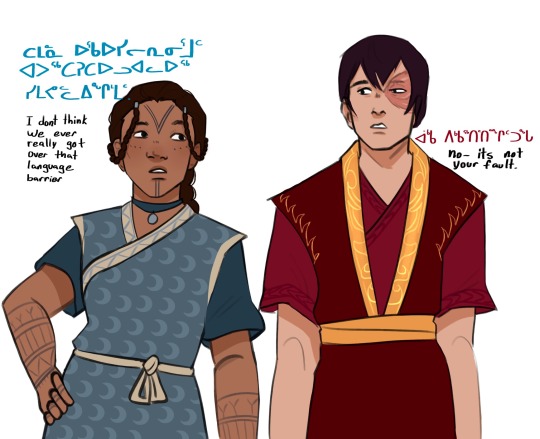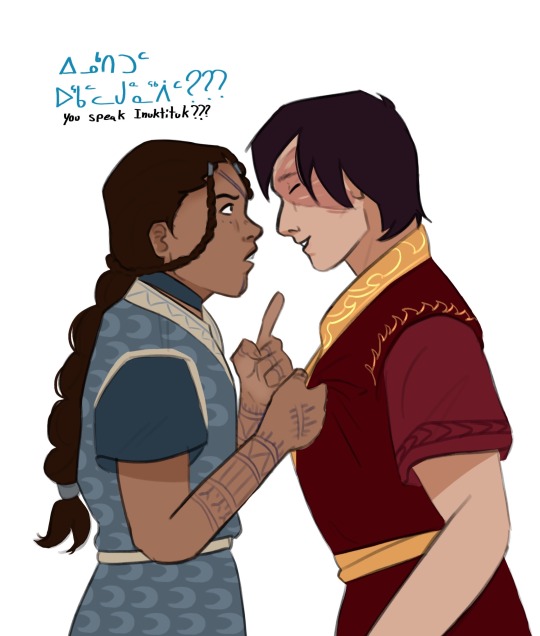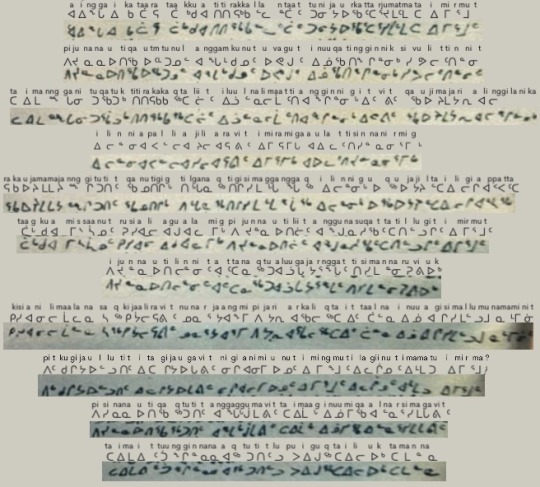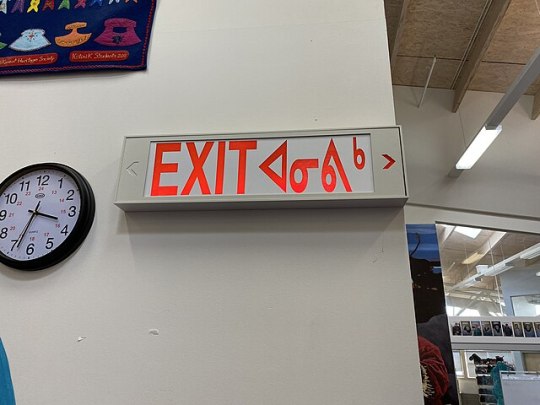#inuktitut
Text


AU in the world of avatar no one speak English. As a prince zuko would know every language OR he would practice.
I would also like to think in this AU aang would also need to learn every language as well to learning the all four elements 
#my art#avatar the last airbender#atla katara#atla zuko#illustration#sketches#Inuit#inuit tattos#inuktitut
1K notes
·
View notes
Text
Inuktitut by Elisapie
I haven't been this excited to discover an album in months.
Inuktitut is Elisapie's fourth album, and it's nominally a cover album. Except for two differences: It's sung entirely in the Inuit language, and these 'covers' are absolutely brilliant rearrangements. Familiar songs are completely transformed, both through genius reorchestration and subtle changes that make each song sound like it was originally written in Inuit—as if no other language could really be suited for those songs.
Elisapie's vocals deserve plenty of credit too, of course. Her voice is rich and enveloping, but with a certain chilly depth that lends even the lightest of pop songs gravitas.
My favorite song is almost certainly Elisapie's entirely brass take on Pink Floyd's "Wish You Were Here", but every single track stands out and stands alone. Metallica, Fleetwood Mac, Queen, Cyndi Lauper, Led Zeppelin, Blondie—Inuktitut includes and perfectly reappropriates a broad swath of popular music, fearlessly and effortlessly.
I do not know how to recommend this album to you strongly enough. It is a must-listen.
#vaguegrant's music finds#music#bandcamp#music recommendation#indigineous people#first nations#quebec#inuit#elisapie#inuktitut#Bandcamp
909 notes
·
View notes
Text
Mitiarjuk Nappaaluk was 22 years old in 1953 when Catholic missionaries in Nunavik, the Inuit homeland in what is now northern Quebec, came to her asking for help in learning her native language.
Nappaaluk started by writing down sentences in Inuktitut syllabics, using as many words as she could find. She eventually let her mind wander and started inventing characters, imagining the life of an independent young woman named Sanaaq.
Nappaaluk ended up working on the story for more than 20 years, while also raising seven children, working as a teacher and spending summers in the family’s hunting camp.
The writing was interrupted by two trips south to receive treatment for tuberculosis — the first a five-year stint, the second for six months — during the TB epidemic of the 1950s and ‘60s. When Nappaaluk returned to Nunavik, it was rapidly changing, as southern business interests, agents for the federal government and missionaries reshaped life in the North. She worked her impressions of these changes into the story. [...]
Continue Reading.
Tagging: @politicsofcanada
304 notes
·
View notes
Text
Mitiarjuk Nappaaluk was 22 years old in 1953 when Catholic missionaries in Nunavik, the Inuit homeland in what is now northern Quebec, came to her asking for help in learning her native language.
Nappaaluk started by writing down sentences in Inuktitut syllabics, using as many words as she could find. She eventually let her mind wander and started inventing characters, imagining the life of an independent young woman named Sanaaq.
Nappaaluk ended up working on the story for more than 20 years, while also raising seven children, working as a teacher and spending summers in the family’s hunting camp.
The writing was interrupted by two trips south to receive treatment for tuberculosis — the first a five-year stint, the second for six months — during the TB epidemic of the 1950s and ‘60s.
When Nappaaluk returned to Nunavik, it was rapidly changing, as southern business interests, agents for the federal government and missionaries reshaped life in the North. She worked her impressions of these changes into the story.
The result was Sanaaq, the first novel written in Inuktitut syllabics in Canada. It was published in Inuktitut in 1984 and has since been translated into both French and English. It is considered a classic of Inuit literature.
315 notes
·
View notes
Text
We tend to think languages of different groups within the same family are so much more difficult to learn than languages of the same group until we try to learn a language that is actually from a different family
Sure, as a Portuguese speaker, it's harder to learn English than to learn Spanish, but it doesn't compare to trying to learn Inuktitut or Japanese, than you find out English and Spanish are actually more of less at the same level of difficulty
When you start studying Chinese or Tupi you think "dang, it's not enough to replace a word for another and change word order, I have to think about the world around me in a completely different way, I have to relearn from scratch what it means to speak a language"
#languages#lingblr#langblr#language learning#language families#language groups#indo european#english#portuguese#spanish#inuktitut#japanese#tupi#tupi guarani#chinese
85 notes
·
View notes
Text
Untranslatable words (part 3)
Here are part 1 and part 2. I have also made other posts with untranslatable words in Spanish and German.
Arabic: غرفة [ḡurfa] (the amount of water that can be held in one hand), يقبرن [yaqbirna] (literally “may you bury me”, wishing that a loved one outlives you because of how unbearable life would be without them)
Bantu: mbuki-mvuki (to shed one’s clothing spontaneously and dance naked in celebration)
Dutch: gezellig (cozy, nice, pleasant, sociable), struisvogelpolitiek (literally “ostrich politics”, an evasive style of politics that fails to address problems by either ignoring them or by creating a false sense of security through ineffective measures)
Finnish: poronkusema (the distance a reindeer can comfortably travel before taking a break, around 7.5 kilometers/4.7 miles)
French: feuillemorte (of the color of a faded, dying leaf), l’appel du vide (literally “the call of the void”, the inexplicable draw of the dangerous and unknown future), noceur (someone who goes to sleep late or not at all or one who stays out late to party)
German: Drachenfutter (literally “dragon fodder”, the gift a husband gives a wife when he is trying to make up for bad behaviour), Kabelsalat (literally “cable salat”, cable clutter)
Greek: μεράκι (intense passion)
Hungarian: szimpatikus (nice, likeable)
Japanese: ぼけっと [boketto] (gazing vacantly into the distance without thinking about anything), 風物詩 [fūbutsushi] (the things that evoke memories of a particular season)
Hawaiian: ʻakihi (listening to directions and then walking off and promptly forgetting them)
Hindi: जुगाड़ (jugāṛ) (a process or technique that lessens disorder in one’s life, making it easier to manage or more convenient)
Icelandic: tíma (not being ready to spend time or money on a specific thing despite being able to afford it)
Indonesian: jayus (a joke so terrible and unfunny it can’t help but make you laugh)
Inuktitut: ᐃᒃᑦᓱᐊᕐᐳᒃ [iktsuarpok] (the act of repeatedly going outside to check if someone is coming)
Italian: commuòvere (to move in a heartwarming way)
Malay: pisan zapra (the time needed to eat a banana)
Norwegian: forelsket (the indescribable feeling of euphoria experienced as one begins to fall in love)
Portuguese: nefelibata (literally “cloud-walker”, one who lives in the clouds of their own imagination or dreams or does not obey the conventions of society), saudade (a vague, constant desire for something that does not and probably cannot exist, a nostalgic longing for someone or something loved and then lost)
Russian: разлюбить (razliubit) (to fall out of love)
Sanskrit: कल्प [kalpa] (the passing of time on a grand cosmological scale)
Scottish Gaelic: sgrìob (the peculiar itchiness that settles on the upper lip before taking a sip of whiskey)
Spanish: cotisuelto (someone who insists on wearing their shirt tails untucked)
Swedish: mångata (the roadlike reflection of the moon on the water), smultronställe (literally “place of wild strawberries”, a special place treasured for solace and relaxation, free from stress or sadness), tretår (on its own, “tår” means a cup of coffee and “patår” is the refill of said coffee, so a “tretår” is therefore a second refill)
Tagalog: kilig (to experience shivers and suffer pangs from strong emotions, usually romantically)
Ursu: گویا [goyā] (a transporting suspension of disbelief, an “as-if” that feels like reality), ناز [nāz] (the pride and assurance that comes from knowing one is loved unconditionally)
Wagiman: murr-ma (the act of searching for something in the water with only one’s feet)
Welsh: glas wen (literally “blue smile”, one that is sarcastic or mocking), hiraeth (homesickness, nostalgia, a longing for somewhere one cannot or will not return to)
Yiddish: לופֿטמענטש [luftmentsh] (literally “air person”, someone who is a bit of a dreamer)
#langblr#arabic#bantu#dutch#finnish#french#german#greek#hungarian#japanese#hawaiian#hindi#icelandic#indonesian#inuktitut#italian#malay#norwegian#portuguese#russian#sanskrit#scottish gaelic#spanish#swedish#tagalog#ursu#wagiman#welsh#yiddish
139 notes
·
View notes
Text
Inuktitut in Avatar
While watching the new Avatar, I was like fascinated that they put Inuktitut syllabics in the show. I can’t say I’ll be able to compare a translation to the show, but I did my best to piece out the transliteration


10 notes
·
View notes
Text
I feel deficient in this class. My mother never speaks to me in Inuktitut anymore. Residential schools have beaten the Inuktitut out of this town in the name of progress, in the name of decency. Everyone wanted to move forward. Move forward with God, with money, with white skin and without the shaman's way. It made me wonder what I was not being taught. It made me wonder why the teachings I was receiving felt like sandpaper against my skin. It made me sad to have Inuktitut slip away. It lives under my subconscious just like the secrets of the teacher do.
Tanya Tagaq, Split Tooth
#Tanya Tagaq#Split Tooth#Inuktitut#residential schools#Truth and Reconciliation#National Day of Truth and Reconciliation#regret#loss#Indigenous literature#Inuit literature#quotes#quotes blog#literary quotes#literature quotes#literature#book quotes#Orange Shirt Day
20 notes
·
View notes
Text

Uninhabited Qaqaluit Island is off the east coast of Baffin Island, Nunavut, Canada. In the Inuktitut language the name Qaqaluit means "fulmar" for the vast number of seabirds here.
9 notes
·
View notes
Text
This week's word is...
ᐃᒃᑦᓱᐊᕐᐳᒃ! (Inuktitut)
[verb]
• The feeling of anticipation while waiting for someone to arrive and intermittently checking outside for them.
11 notes
·
View notes
Text

Emergency sign with both English and Inuktitut at the Kiilinik High School in Cambridge Bay, Nunavut, Canada
11 notes
·
View notes
Text
Nunavut's language laws are being reviewed for the first time since some of them came into force 15 years ago.
The Official Languages Act, which became law in 2013 and the Inuit Language Protection Act, first signed into law in 2008, mandate the use of Inuktut, French and English in the territory. The legislation is supposed to be reviewed every five years, but hasn't been until now.
Different groups presented their suggested amendments to both laws last week in the legislative assembly during a four-day televised hearing before the standing committee on legislation.
Joelie Kaernerk, Nunavut's newly sworn-in minister of languages, told the committee that one of his department's suggested amendments would require the federal government to comply with Inuit language laws. [...]
Continue Reading.
Tagging: @politicsofcanada
50 notes
·
View notes
Text
*also known as ᐃᓄᒃᑎᑐᑦ
note: this is a remake of a now-privated older poll.
reblogs are encouraged :-) please be respectful when commenting!
62 notes
·
View notes
Text
I watched Slash Back yesterday and here are some things I liked about it.
For those who don't know what movie it is: it's the summer solstice in a small inuit village in Canada. A group of teenagers are going about their day in the usual boring summer way while some animals start to behave weirdly. Soon, one of them discovers why and, after they are attacked, they decide to use their inuit hunting skills to defend their village from the unwelcome intruders.
They mainly speak English but some Inuktitut is also spoken by some of the parents and the radio. All the titles and credits are both in Inuktitut and English.
Teenagers looking like teenagers and behaving like teenagers.
The Crush is the most average boy ever but it obviously doesn't matter.
Capturing the greatest hits of adolescence such as not having much to do, nowhere to do it, anywhere will do or there is a super duper great party that is just a bunch of kids your age with whom you don't necessarily speak and also, again not much to do there.
As any teenage story goes, parents are unavailable. In this case because they are partying in the local festivity.
Fighting the big monster is perfectly compatible with arguing with your friend about your crush and about whether or no she also likes him.
One of the girls doesn't want to join the hunting party because she is scared. Her friends try to encourage her a bit but she is still afraid, so they tell her it's ok and give her a mission she can do that will also help and that is actually also important, while keeping her save anyways.
Simple story, easy to follow. It has good moments of tension but it is not extremely dramatic.
26 notes
·
View notes
Text
Untranslatable words (part 2)
Here are part 1 and part 3. I have also made other posts with untranslatable words in Spanish and German.
Cook Islands Māori: papakata (to have one leg shorter than the other)
Czech: prozvonit (to call a cellphone only to have it ring once so that the other person calls back, allowing the caller not to spend money on minutes)
Finnish: tokka (a large herd, especially of reindeer)
French: rire dans sa barbe (literally “to laugh in one’s beard”, to laugh quietly while thinking about something that happened in the past)
German: Schilderwald (literally “forest of signs”, a street crowded with so many road signs that you become lost)
Hindi: चाय-पानी [chaay-paanee] (literally “tea and water”, money given to someone, often a bureaucratic worker, to get things done)
Inuktitut: ᐃᒃᑦᓱᐊᕐᐳᒃ [iktsuarpuk] (the frustration of waiting for someone to turn up)
Italian: culaccino (the mark left on a table by a moist glass), gattara (a woman, often old and lonely, who devotes herself to stray cats)
Japanese: 哀れ [aware] (the bittersweetness of a brief and fading moment of transcendent beauty), 木漏れ日 [komorebi] (the sort of scattered, dappled light effect that happens when sunlight shines in through trees), 教育ママ [kyōiku mama] (a mother who pushes her children into academic achievements), 積ん読 [tsundoku] (the act of leaving a book unread after buying it, typically piling it up together with other unread books), 侘寂 [wabi-sabi] (accepting the natural cycle of growth and decay)
Korean: 원 [won] (the reluctance on a person’s part to let go of an illusion)
Kwangali: hanyauku (the act of walking on tiptoes across warm sand)
Luba-Kasai: ilunga (a person who is ready to forgive any abuse for the first time, to tolerate it a second time, but never a third time)
Rapa Nui: tingo (to gradually steal all the possessions out of a neighbor’s house by borrowing and not returning)
Russian: почемучка [pochemuchka] (a person who asks a lot of questions)
Swedish: gökotta (to wake up early in the morning with the purpose of going outside to hear the first birds sing)
Yagan: mamihlapinatapei (a wordless yet meaningful look shared by two people who both desire to initiate something but are both reluctant to start)
Yiddish: שלימזל [shlimazl] (a chronically unlucky person)
#langblr#cook islands māori#czech#finnish#french#german#hindi#inuktitut#italian#japanese#south korea#kwangali#luba-kasai#rapanui#russian#swedish#yagamitoll#yiddish
188 notes
·
View notes